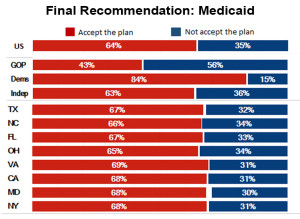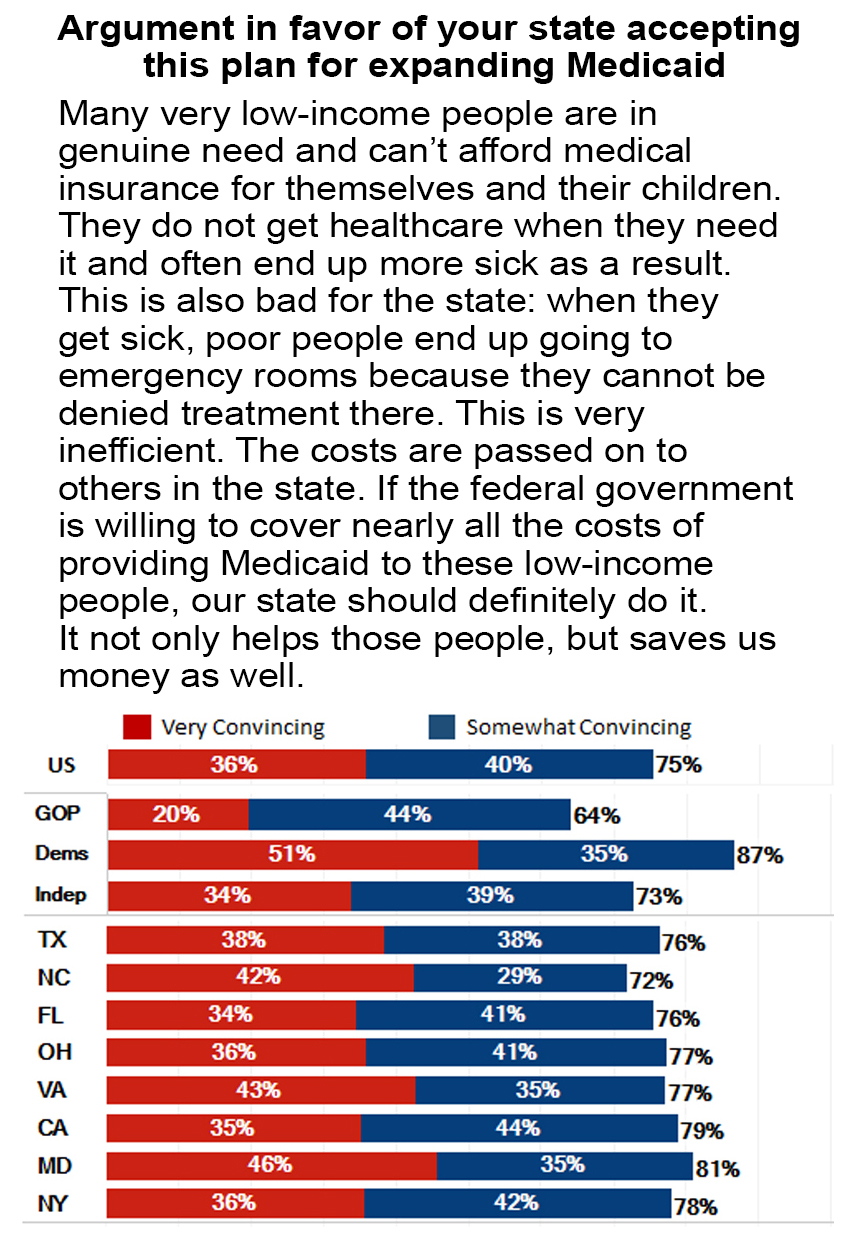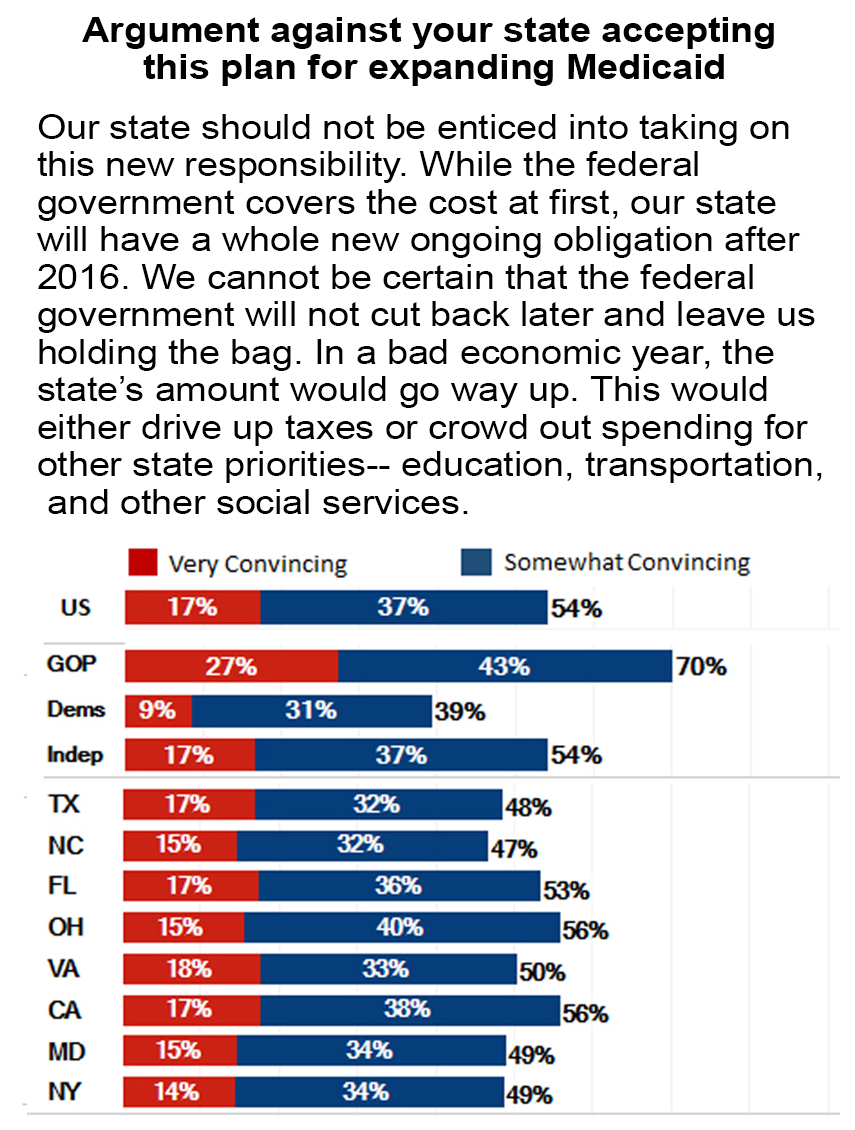As part of a larger survey on Federal poverty programs, the Program for Public Consultation at the University of Maryland, asked a series of question about the controversial topic of states expanding their Medicaid coverage with Federal help, as part of the Affordable Care Act.
Consistent with the method of public consultation, respondents went through a process (called a ‘policymaking simulation’) in which they were given a short briefing on the issue, and evaluated pro and con arguments before making their final recommendation. The content of the briefing and the pro and con arguments were reviewed by Congressional staffers from both parties and other experts across the spectrum of opinion on the issue.
The survey was fielded online Nov. 11, 2016 – Jan. 18, 2017. The sample of 7,128 respondents was drawn from Nielsen-Scarborough’s larger national sample which was recruited by mail and telephone using a random sample of households. Additional recruiting by telephone and mail was conducted by Communication for Research. The margin of error is +/- 1.2 percent.
Because the sample was so large, it included samples of about 400 or more in eight states including four that have not acceded to Medicaid expansion. These four states and their sample sizes with margin of error are Virginia (463 +/- 4.6 percent), North Carolina (402 +/- 4.9 percent), Florida (423 +/- 4.8 percent), and Texas (398 +/- 4.9 percent). Another state that has not acceded is Oklahoma which had a smaller sample of 307 (+/-5.6 percent).
In addition, there were substantial samples for four states that have acceded including
California (682 +/- 3.8 percent), Maryland (486 +/- 4.4 percent). New York (401 +/- 4.9 percent), and Ohio (509 +/- 4.3 percent).
Introduction to the Issue
Consistent with the public consultation method respondents were fist given some background on the issue. method Respondents were introduced to the Medicaid program as follows:
As you may know, Medicaid is a government health insurance program that serves low-income people. Medicaid is a partnership between the federal government and the states. Currently, the federal government covers on average 60% of the cost, while the states cover the other 40%.
They were then told about the issue of Medicaid expansion:
There is a lot of discussion these days about a proposal to expand Medicaid. In 2013, for people to receive Medicaid, they had to be well below the poverty line–on average, no more than 61%. For example, for a single parent with two children, their income could be no more than $11,316.
They were asked, “Based on what you have heard so far, please select how you feel about raising this limit to some extent” and given a scale of 0 to 10 with 0 being not at acceptable, 5 being just tolerable, and 10 being very acceptable. The mean response was 5.7. Seventy-three percent said it would be at least tolerable by giving a response of 5 or more), and 50 percent gave a response of 6 or more.
Republicans were a bit lower with a mean score of 5.0, 68 percent rating it at least tolerable, and 39 percent giving a rating of 6 or more. Among Democrats the mean score was 6.4, with 78 percent rating it as at least tolerable and 61 percent giving it a score of 6 or more.
Evaluation of Pro and Con Arguments
They were presented arguments in favor and against the idea of their state accepting this plan. The argument in favor was found convincing by three quarters, including two thirds Republicans.
The argument against was found convincing by a modest majority, seven in ten Republicans, and less than half of Democrats.
Final Recommendation
 Finally asked what they would recommend for their state, two thirds favored accepting the plan, though a majority of Republicans were opposed. The states were strikingly uniform, with majorities in favor ranging from 63-68%. These included four states where the state has not accepted the Medicaid plan: Virginia, North Carolina, Texas and Florida. In Oklahoma, which had a smaller sample of 307, 63% favored it.
Finally asked what they would recommend for their state, two thirds favored accepting the plan, though a majority of Republicans were opposed. The states were strikingly uniform, with majorities in favor ranging from 63-68%. These included four states where the state has not accepted the Medicaid plan: Virginia, North Carolina, Texas and Florida. In Oklahoma, which had a smaller sample of 307, 63% favored it.
In every state, overwhelming majorities of Democrats favored Medicaid expansion, ranging from 82% in New York to 92% in Virginia. In every state, Republican support fell under half ranging from 39% in Virginia to 47% in Texas, Florida and Ohio. Opposition ranged from 52% in Texas and Ohio to 60% in Virginia. In Oklahoma 84% of Democrats were in favor as compared to 47% of Republicans.

